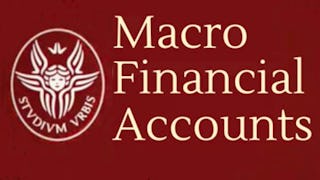This course provides an in-depth analysis of Macroeconomic Financial Accounts. Each module will delve into one specific Institutional Sector of the National Economy i.e., Financial and non-Financial Corporations, Households, the Government. The Rest of the World is also covered. Students are expected to have a basic understanding of macroeconomic principles and financial accounting. Course 1 or equivalent knowledge is recommended for those with limited experience in macroeconomic financial accounting. Proficiency in using spreadsheets for data analysis is also beneficial. Undergraduates in their final year or university students interested in monetary and financial economics, international macroeconomics, and data mining can benefit from this course. Professionals in government institutions, central banks, business, and the financial industry, along with other individuals interested in finance and macroeconomics, may also find this course valuable. By the end of this course, students will gain a deeper understanding of the financial connections among and within the institutional sectors in market economies.

Profitez d'une croissance illimitée avec un an de Coursera Plus pour 199 $ (régulièrement 399 $). Économisez maintenant.

Expérience recommandée
Compétences que vous acquerrez
- Catégorie : Fiscal Management
- Catégorie : Behavioral Economics
- Catégorie : Data Import/Export
- Catégorie : Financial Management
- Catégorie : International Finance
- Catégorie : Financial Systems
- Catégorie : Policty Analysis, Research, and Development
- Catégorie : Governmental Accounting
- Catégorie : Economics
- Catégorie : Financial Accounting
- Catégorie : Microsoft Excel
- Catégorie : Corporate Finance
- Catégorie : Data Analysis
- Catégorie : Financial Policy
- Catégorie : Public Administration
- Catégorie : International Relations
- Catégorie : Quantitative Research
- Catégorie : Balance Sheet
- Catégorie : Financial Data
Détails à connaître

Ajouter à votre profil LinkedIn
Découvrez comment les employés des entreprises prestigieuses maîtrisent des compétences recherchées

Il y a 6 modules dans ce cours
This course provides an in-depth analysis of Macroeconomic Financial Accounts. Each module will delve into one specific Institutional Sector of the National Economy i.e., Financial and non-Financial Corporations, Households, the Government. Altough not considered an Institutional Sector but the complement to the Domestic Economy, the Rest of the World is also covered. Students are expected to have a basic understanding of macroeconomic principles and financial accounting. Course 1 or equivalent knowledge is recommended for those with limited experience in macroeconomic financial accounting. Proficiency in using spreadsheets for data analysis is also beneficial. Undergraduates in their final year or university students interested in monetary and financial economics, international macroeconomics, and data mining can benefit from this advanced course. Professionals in government institutions, central banks, business, and the financial industry, along with other individuals interested in finance and macroeconomics, may also find this course valuable. The lectures, tutorials, and activities guide participants step-by-step through the characteristics of the Institutional Sectors. References to the macroeconomic databanks of major national and international institutions (OECD, European Central Bank, US Federal Reserve System, Bank for International Settlements, IMF) are included. By the end of this course, students will gain a deeper understanding of the financial connections among and within the Institutional Sectors in market economies. Student activities include manipulating data downloaded from institutional websites with spreadsheets to construct tables and graphs.
Inclus
10 vidéos12 lectures1 évaluation par les pairs
This week’s lectures will provide a comprehensive understanding of financial corporations, their global economic roles, and their impact on monetary policy. Prepare to engage with Andreas, Gabriele, and Miguel to deepen your knowledge of this vital sector
Inclus
6 vidéos13 lectures1 évaluation par les pairs
This week Riccardo De Bonis from the Bank of Italy will help us understand the financial behaviour of households, a central theme in economic analysis.
Inclus
5 vidéos10 lectures1 évaluation par les pairs
This week we focus on the financial behaviour of non-financial corporations
Inclus
4 vidéos8 lectures1 évaluation par les pairs
The role of governments in the financial functions of market economies
Inclus
4 vidéos7 lectures1 évaluation par les pairs
The Balance of Payments and the International Investment Position.
Inclus
6 vidéos11 lectures1 devoir1 évaluation par les pairs
Instructeurs



Offert par
En savoir plus sur Economics
 Statut : Prévisualisation
Statut : PrévisualisationSapienza University of Rome
 Statut : Prévisualisation
Statut : PrévisualisationO.P. Jindal Global University
 Statut : Prévisualisation
Statut : PrévisualisationThe University of Sydney
 Statut : Essai gratuit
Statut : Essai gratuitFundação Instituto de Administração
Pour quelles raisons les étudiants sur Coursera nous choisissent-ils pour leur carrière ?




Foire Aux Questions
macrifinac.sapienza@uniroma1.it
To access the course materials, assignments and to earn a Certificate, you will need to purchase the Certificate experience when you enroll in a course. You can try a Free Trial instead, or apply for Financial Aid. The course may offer 'Full Course, No Certificate' instead. This option lets you see all course materials, submit required assessments, and get a final grade. This also means that you will not be able to purchase a Certificate experience.
When you purchase a Certificate you get access to all course materials, including graded assignments. Upon completing the course, your electronic Certificate will be added to your Accomplishments page - from there, you can print your Certificate or add it to your LinkedIn profile.
Plus de questions
Aide financière disponible,
¹ Certains travaux de ce cours sont notés par l'IA. Pour ces travaux, vos Données internes seront utilisées conformément à Notification de confidentialité de Coursera.





